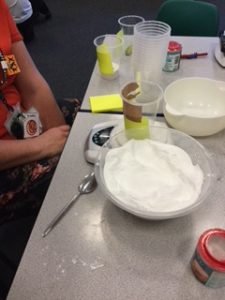Have you ever wondered why every time you eat salty foods, you get thirsty? Or why fresh vegetables tend to shrivel up when you sprinkle salt on them?
The answer is simple. Salt is a desiccant – it helps remove water from things, including human bodies. Which is why the Ancient Egyptians used salts when they were mummifying bodies.
Year 4 decided to put this to the test and used a quarter of an apple for the experiment.
First, we had to make natron.
Classically, natron was gathered from a salt mixture derived out of dry lake beds in ancient Egypt and was used as a cleansing product for personal use. The consistency of natron removes oil and grease and was often used as a type of soap when mixed with oil. To make our own natron we mixed together salt and baking soda. After mixing these together in a sealed bag, we had our own form of natron.
Baseline measurement
Why is this important?
“We had to weigh the apple first because that would give us a starting weight. If we didn’t do this then we would have nothing to compare the next weight measurement to.”
Predictions
“I predict that the apple will shrivel up and rot.”
“I think the natron will get rid of all the water and the apple will weigh less next time.”
We will be observing this experiment over three weeks, with weekly weigh ins.






In order to make some comparisons about the effectiveness of preservatives, we put a piece of apple in just sugar and another one without anything at all!
Stay posted to find out if our apple mummifications were a success.